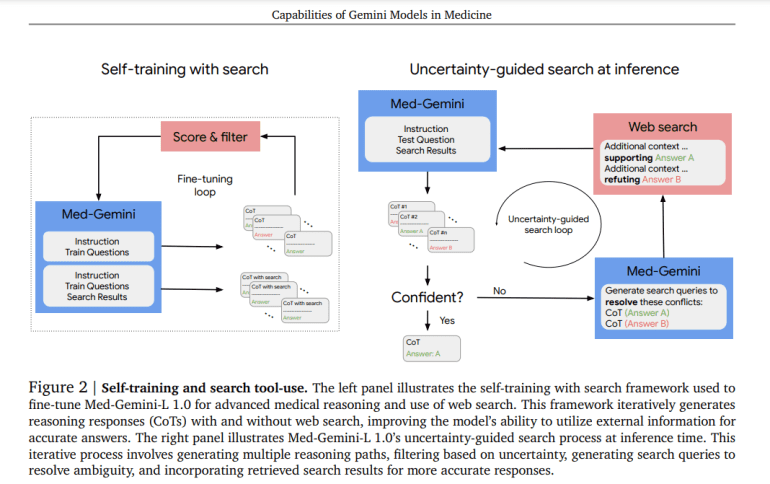- Google DeepMind introduces Med-Gemini, a new family of AI models for medical applications.
- Med-Gemini aims to address limitations in existing AI models by enhancing clinical reasoning, multimodal understanding, and long-context processing.
- Key features include uncertainty-guided web search, custom encoders for health-related signals, and chain-of-reasoning methodologies.
- Med-Gemini models surpass previous benchmarks, achieving state-of-the-art results on 14 benchmarks across 25 tasks.
- Exceptional performance in medical reasoning, image analysis, video analysis, and information retrieval from health records.
Main AI News:
The integration of artificial intelligence (AI) into healthcare is fundamentally transforming the landscape of medical practices, from diagnosis to treatment planning and research assimilation. AI models, particularly advanced ones, are poised to elevate healthcare standards by bolstering accuracy and efficiency. However, the complexity of medical data, spanning images, videos, and electronic health records (EHRs), poses a formidable challenge for AI systems, necessitating adept comprehension and interpretation capabilities.
Nevertheless, challenges persist in ensuring the seamless analysis of medical data by AI models. Existing models often grapple with comprehending multimodal information, synthesizing extensive contextual records, and retrieving medical insights from diverse sources accurately. Hence, there is a pressing need for AI solutions tailored to proficiently handle medical data while offering precise real-time support to medical practitioners.
Notably, large language models (LLMs) encounter hurdles in clinical contexts, struggling with medical inquiries and processing diverse data types like medical images and videos. Moreover, their effectiveness in synthesizing information from lengthy EHRs remains subpar. Consequently, there’s a demand for specialized AI tools designed to comprehend medical data intricacies, thereby furnishing accurate and timely assistance within clinical settings.
Addressing these exigencies, the collaborative efforts of Google Research, Google DeepMind, Google Cloud, and Verily have yielded the Med-Gemini family of models. These models, an extension of the Gemini 1.0 and 1.5 architectures, incorporate specialized components tailored for medical applications. Med-Gemini endeavors to surmount prevailing limitations by enhancing clinical decision-making, multimodal comprehension, and contextual processing, thereby setting a new benchmark in medical AI.
Med-Gemini’s advancements build upon the foundation of the Gemini architecture, introducing groundbreaking features such as uncertainty-guided web search to facilitate precise medical query resolution. Additionally, custom encoders adept at processing health-related signals, such as electrocardiograms (ECGs), augment its capabilities. Moreover, the integration of chain-of-reasoning methodologies enhances its capacity to process and decipher extensive medical records, ensuring nuanced understanding and accurate responses.
Demonstrating substantial progress, Med-Gemini models have eclipsed prior benchmarks, achieving state-of-the-art results across 14 benchmarks encompassing 25 tasks. Notably, they have outperformed counterparts like GPT-4 and Med-PaLM 2, boasting a remarkable 91.1% accuracy on the MedQA (USMLE) benchmark, surpassing Med-PaLM 2 by 4.6%. Moreover, these models excel in multimodal tasks, exhibiting significant enhancements in medical image and video analysis, alongside precise information retrieval from extensive health records. The exceptional performance of Med-Gemini underscores its prowess in accurate medical reasoning, signifying a paradigm shift in healthcare AI.
Conclusion:
The introduction of Med-Gemini by Google DeepMind signifies a significant advancement in medical AI. With its enhanced capabilities in clinical reasoning and multimodal understanding, Med-Gemini sets a new standard for AI models in healthcare. This innovation has the potential to revolutionize medical diagnosis, treatment planning, and research, offering more accurate and efficient support to medical professionals. As a result, we anticipate increased adoption of AI technology in the healthcare industry, leading to improved patient outcomes and enhanced operational efficiency for healthcare providers.

